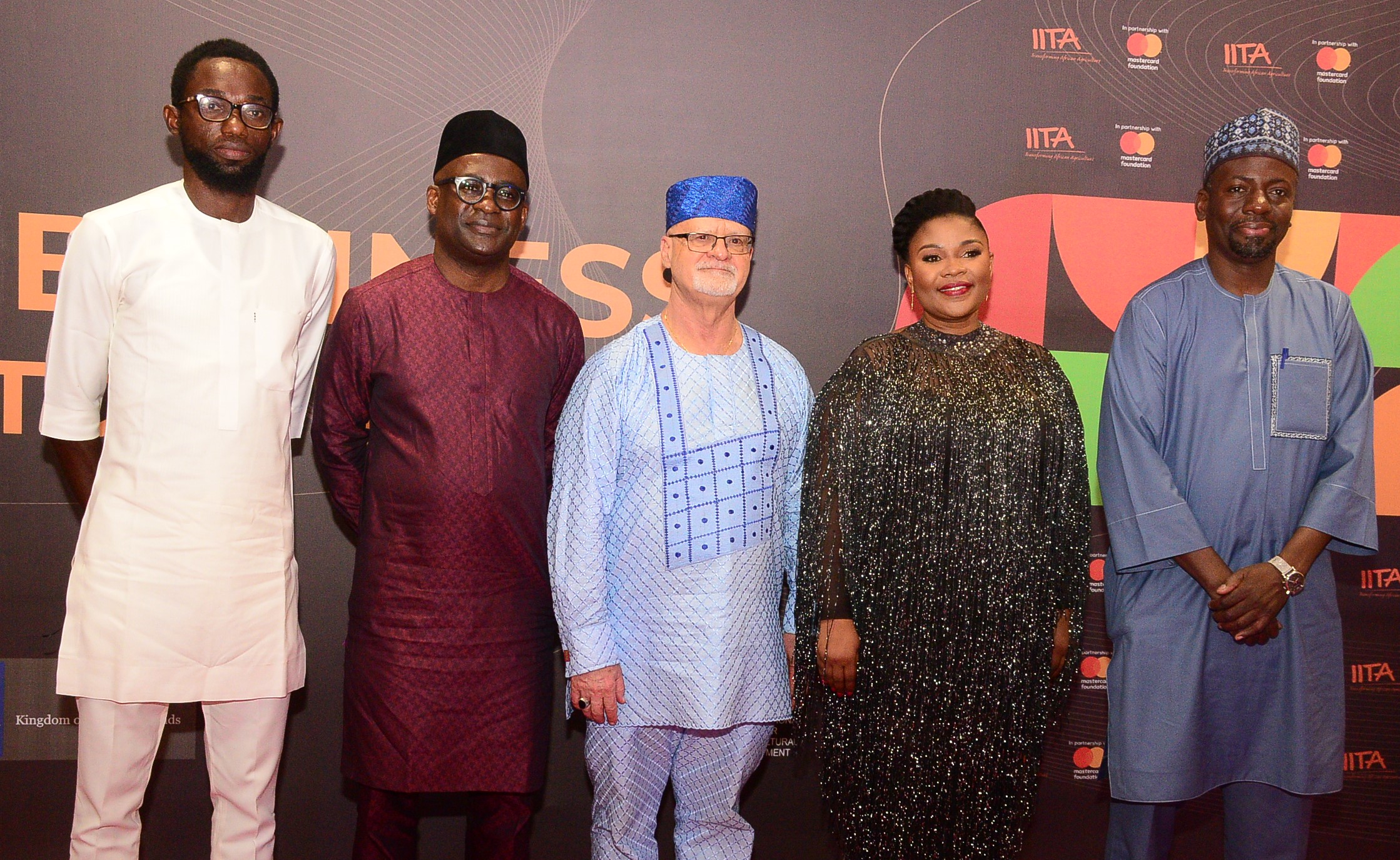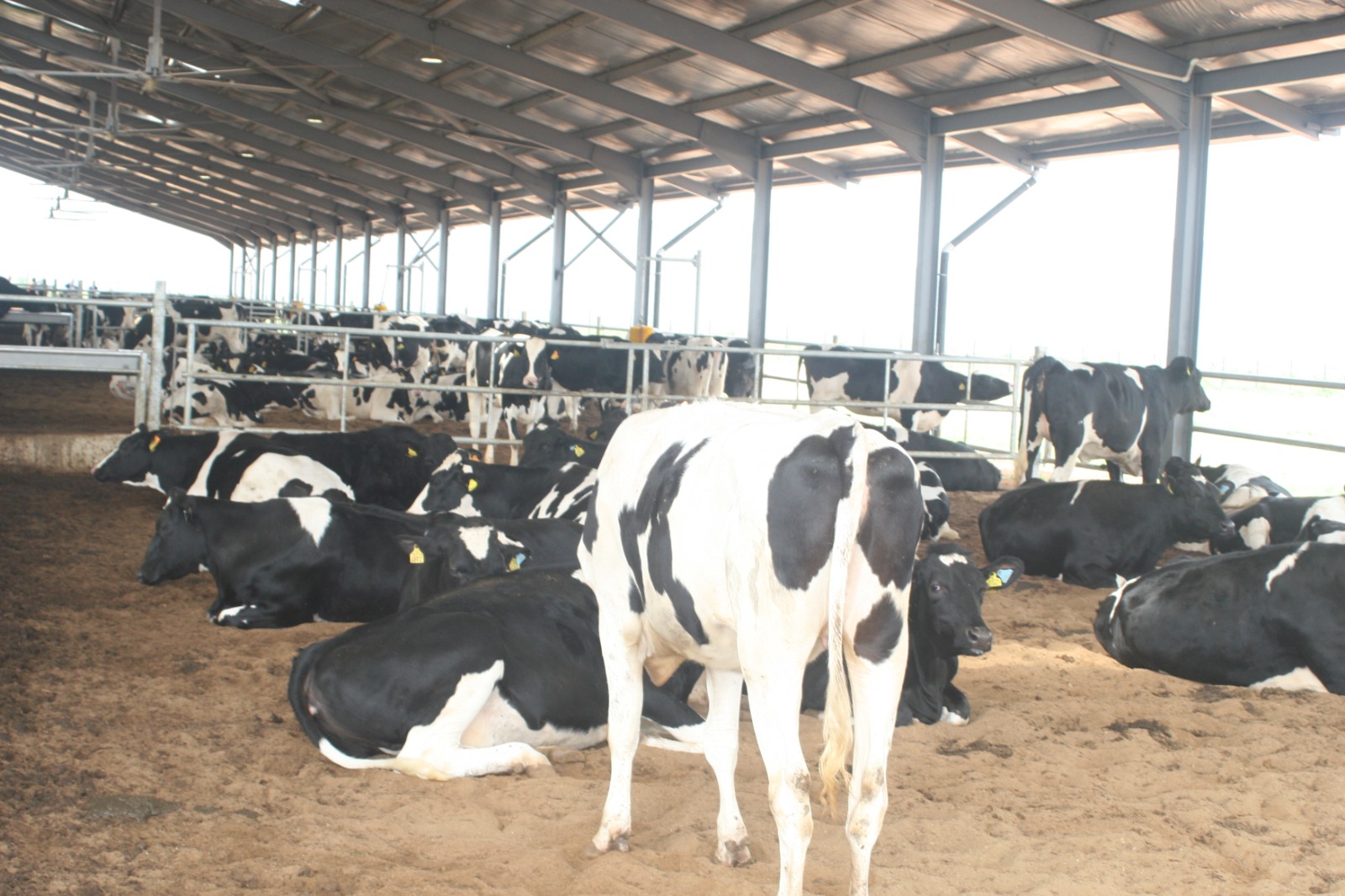L-R: Chief Executive Officer, Eupepsia,Samson Ogbole;Managing
Director/Regional Executive, Ecobank Nigeria,Bolaji Lawal;Deputy
Director General, Partnership for Delivery, IITA, Ken Dashiell;
Executive Manager, I-Youth Project, International Institute of Tropical
Agriculture(IITA), Aline Mugisho and General Manager, Nutri K Limited,
Abdoulkader Boukari during the Agribusiness Investors Network organized
by Innovative Youth in Agriculture from IITA in partnership with
Mastercard Foundation held in Lagos on Saturday, June 17,2023.
Government, private sector, and other stakeholders should collaborate more to make agribusiness sustainable, says experts
IITA and partners have advised stakeholders in the agro-industry to collaborate, invest and empower youths to make the sector economically viable and productive.
This was the primary submission at the Agribusiness Investors Network organized by the Innovative Youth in Agriculture (I-Youth) held at the Ecobank Headquarters, Victoria Island, Lagos, on Saturday, June 17, 2023.
The event, organized by the International Institute of Tropical Agriculture (IITA) in partnership with Mastercard Foundation and Ecobank, had in attendance the former President of the Federal Republic of Nigeria, Chief Olusegun Obasanjo, representatives of African Development Bank, Lagos State Government, Sterling Bank, First City Monument Bank, First Bank Plc, Nigerian Agribusiness Group and Fintech Association of Nigeria.
In his welcome remarks, Deputy Director, General Partnership for Partnership and Delivery, International Institute of Tropical Agriculture (IITA), Ken Dashiell, noted that it has become imperative for stakeholders to work together to empower the youth in transforming Nigeria’s Food system. Dashiell said government and other developmental partners must begin to put the right policies and programs in place to attract the youth into agriculture.
In his keynote address, the former President of the Federal Republic of Nigeria, Chief Olusegun Obasanjo, who is also an ambassador of IITA, said that a concerted effort must be made to ensure that the funding gap in agribusiness is bridged, adding that financial institutions, investors and entrepreneurs must collaborate.
Obasanjo noted that the sector must be attractive for the youth, saying no serious entrepreneur would be interested in seeking a double-digit loan.
He explained that the agricultural sector had suffered too long due to lack of commitment in industry development and inadequate funding from the government as well as uncertainty from potential investors and other key stakeholders. He stressed the need for government to invest heavily in the agricultural sector, noting that no nation has witnessed reasonable industrial development without paying adequate attention to agriculture.
Also speaking, the Managing Director and Regional Executive of Ecobank Nigeria, Mr Bolaji Lawal, explained that the bank is committed to supporting any investment that will stimulate the growth of Nigeria’s economy and transform the opportunities in Nigeria into business and empowerment for the youth. Lawal noted that the bank is ready and determined to tap into the energy of the vibrant young population in Nigeria by providing incentives that would make agriculture attractive to them.
A beneficiary of the I-Youth project, Areo Evelyn, the Chief Executive Officer of Farm2Fill Enterprises, stated that participating in IITA’s training program greatly impacted her entrepreneurial journey as she now offers a variety of agriculture produce to local and international markets.
Executive Manager, I-Youth Project, Aline Mugisho, who spoke on ‘De-Risking Agro-Industry Investment,’ emphasized the need for stakeholders to work together to demystify the agricultural sector’s myth around profitability, sustainability, and growth. Mugisho noted that youths are catalysts in agriculture technology and innovation scaling, and when empowered with skills and expertise, they become invaluable assets to companies. She urged stakeholders to begin to look at investment opportunities in the sector and intentionally work toward a sector transformation in order to reposition agriculture within Nigeria’s economy.
About IITA
The International Institute of Tropical Agriculture (IITA) is a nonprofit organization that works with partners to enhance crop quality and productivity, reduce producer and consumer risks, and generate wealth from agriculture, aiming to reduce hunger, malnutrition, and poverty. The organization’s research-for-development (R4D) focuses on addressing the development needs of tropical countries. The institute began with the enactment of Decree 32. of 1967. The institute’s initial goals are to develop a better productive farming system, select and breed high-yielding crop varieties resistant to diseases and pests, and strengthen agricultural research in humid and tropical regions. The institute was initially situated on a 1000-hectare land. The institute focused on a cereal improvement program, grain and legumes improvement program, farming systems, and root and tuber improvement program.
About Innovative Youth in Agriculture (I-Youth)
The Innovative Youth in Agriculture project aims to develop the skills of young people between the ages of 15-35 years to access dignified and fulfilling employment employment within the agrifood value chain in Nigeria. The project is implemented in Lagos, Kano, and Kaduna states and is a partnership between the International Institute of Tropical Agriculture (IITA) in partnership with Mastercard Foundation. IITA is collaborating with the Foundation to build the capacity of 40,000 direct beneficiaries and enable 242,724 indirect beneficiaries with a particular focus on women-led businesses in the three states. The training will prepare youths for employment and entrepreneurship through physical and online learning platforms.
Add a comment






